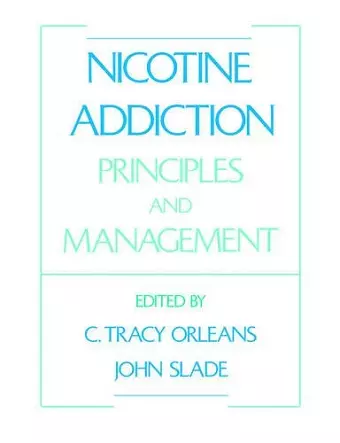Nicotine Addiction: Principles and Management
John Slade editor C Tracy Orleans editor
Format:Hardback
Publisher:Oxford University Press Inc
Published:3rd Mar '94
Currently unavailable, and unfortunately no date known when it will be back

This comprehensive, clinical text on tobacco dependence provides clinicians not only with information on how to diagnose and treat nicotine addicted patients, but also with the medical, epidemiological and behavioral science backgrounds necessary for understanding the process and dynamics of tobacco dependence. The book breaks new ground by defining and explaining nicotine addiction as a primary problem or disease in its own right, instead of as a habit or risk factor for other diseases. It follows the traditional outline of medical texts: Part I covers etiology, pathogenesis and complications; Part II covers diagnosis and treatment; and Part III covers prevention and public health. Part I is designed to present an overview of the biological, psychological, social, and societal factors that contribute to nicotine dependence. Topics include: a description of nicotine delivery systems, psychopharmacology, economics, natural history and epidemiology, mortality, morbidity, and environmental tobacco smoke exposure. Part II provides the clinician with practical guidelines and tools for treating nicotine dependence. The authors describe a stepped-care treatment model, with brief interventions that can be easily integrated into routine medical practice. This section also covers the role of psychopharmacologic and formal treatment programs, the treatment of smokeless toabacco addiction, and treating nicotine dependence in pregnant women and in people with medical illnesses, other chemical dependencies, or psychiatric disorders. The last section, on public health and prevention, focuses on worksite and community intervention programs. It also summarizes the research on smoking patterns and history in women, blacks, hispanics, youth, and older adults, and shows how intervention and prevention programs could be made more effective in these groups. Written by leading experts in this timely field, this imortant work contains information not found elsewhere.
By focusing on nicotine addiction as a primary disease, the authors move beyond seeing smoking as a bad habit or a risk factor for other illnesses. Thus, physicians bave an important opportunity for education and intervention. This important book provides ample cautionary evidence to anyone tempted to propose the legalization of currently illegal drugs as a way to reduce the social costs of any addictive drug. * Robert L. DuPont, Georgetown University School of Medicine, JAMA, October 1994 - Vol 272 No. 15 *
This is a comprehensive and coherent collection of quite excellent chapters on the management and treatment of nicotine dependence. This book is much more than a "how to" manual for health-care professionals. Although there is a strong practical emphasis, the relevant background research is covered very fully by acknowledged experts in the field. The book will serve as a useful reference work for researchers and clinicians alike. * Stephen Sutton, Addiction (1995) 90 *
ISBN: 9780195064414
Dimensions: 243mm x 175mm x 41mm
Weight: 957g
456 pages